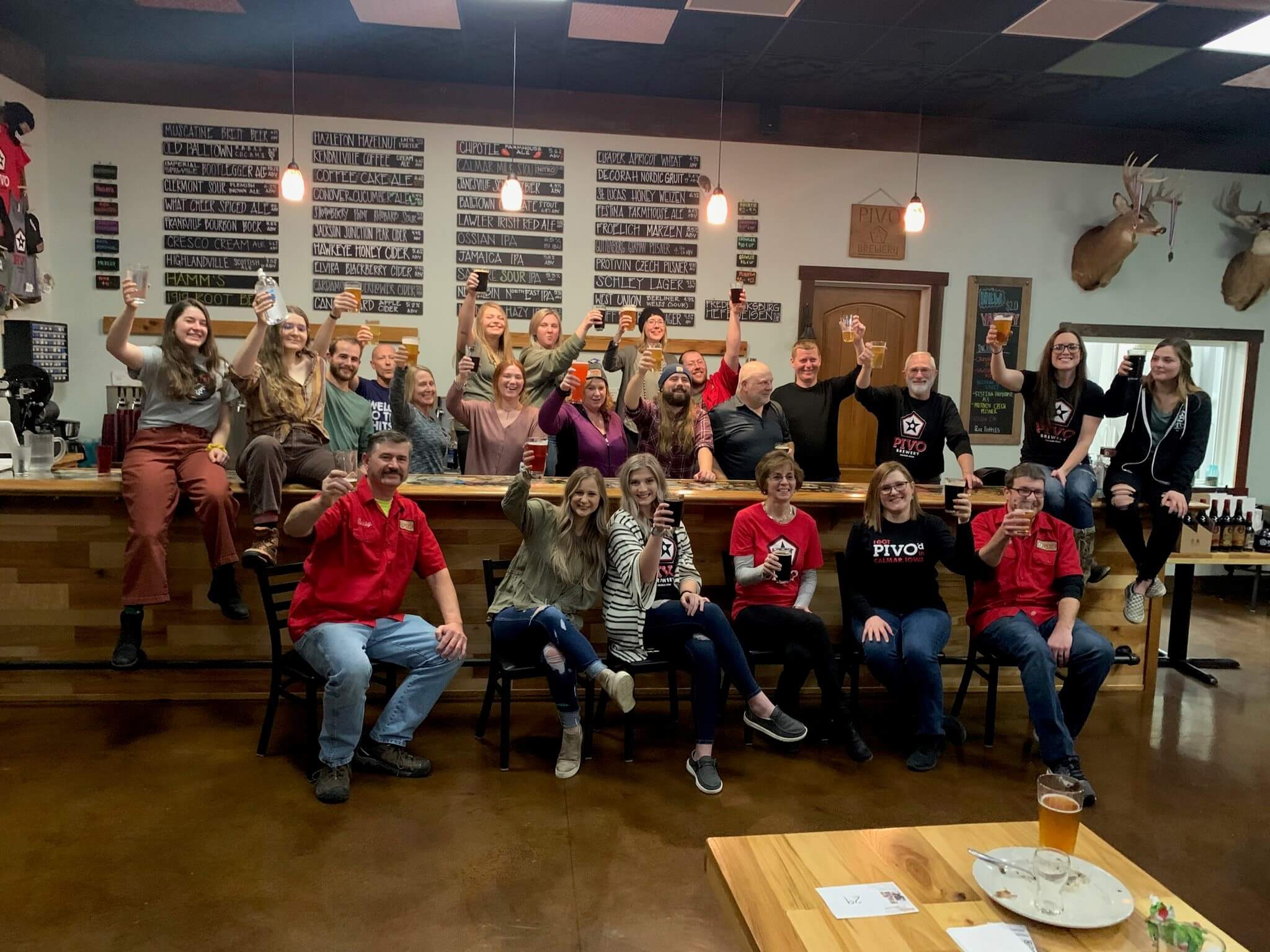Pivo Brewery
Craig and Sarah Neuzil are what you could call “homecomers”. After more than 20 years traveling the world as a military family, they settled back into northeast Iowa where they both grew up on farms. Their business, Pivo Brewery and Blepta Studios, is a brewery, tap room, art studio and event center in Calmar, Iowa, with a population of just around 1000 people.
Sara’s art focuses on ceramic tiles and batik eggs, and she offers social art classes regularly at the studio space. Craig’s focus is beer, and the brewery boasts small batch beer and cider, with enough options on tap to please any palate. They also have a food menu featuring snacks and sandwiches that reflect their eastern European heritage.
In a nod to small town rural sensibilities, their event space occasionally serves as a yoga studio and also holds conceal carry classes. Their tap room offers regular trivia events, as well as BINGO nights, and Bags leagues.
Pivo Blepta LLC was awarded a USDA Value Added Producer Grant for $50,000 in August of 2020 to help them get their cider production off the ground, and get their product to market. “It’s important to build our brand to sustain ourselves,” said Craig. “Without this USDA funding it would be a lot harder to do.”
The Neuzil’s learned about the VAPG program from their local electric cooperative’s customer outreach team, and were introduced to Norman Brus, their local USDA Rural Development representative, to hone the details of the application.
“Pivo” is the Czech word for beer, and while the brewery had a large variety of beer offerings, one of the things they were lacking was a gluten-free option for their customers. Craig had made several gluten-free beers, but was never quite satisfied with the outcome. With ample fruit available from neighboring orchards, and with fruit trees growing on site at the brewery, they decided to make cider.
The brewery uses local fruits, including apples, pears and blackberries, and local honey to create a variety of ciders for their customers. Some of the ciders they make include a Ginger Honey Apple cider, an “Elvira” Blackberry cider and a “Fort Atkinson” Bourbon Barrel cider. They are able to use what are known as “ugly apples” from neighboring orchards, and Winneshiek County helped them to purchase more trees for their own three acres surrounding the site.
 Making cider is similar to brewing beer, minus the need for pasteurization, and so it wasn’t too much of a challenge to pivot some of their resources to beer. “It’s the same type of manufacturing, but we keep things separate because you can’t have cross-contamination dealing with gluten-free products,” said Craig.
Making cider is similar to brewing beer, minus the need for pasteurization, and so it wasn’t too much of a challenge to pivot some of their resources to beer. “It’s the same type of manufacturing, but we keep things separate because you can’t have cross-contamination dealing with gluten-free products,” said Craig.
When COVID 19 started to impact the region, the Neuzil’s pivoted by extending their hours and setting up their menu for to-go orders. In March of 2020, the governor of Iowa made an emergency proclamation to allow alcohol to be part of take-out menus and so the brewery used social media to take advantage of the opportunity and sell their beer and cider with the food orders. The business has changed course a bit to doing more advertising as a way to draw customers in.
Craig believes that people seeking out destinations like theirs really do value locally made products versus the national ones that they can find in any store. “We need to stand out as having a different product,” said Craig. “With our town’s population under 1000 people, and our county having less than 21,000 people, we have to draw people here.”
For those interested in what is known as the “Driftless” Area, named for the deep valleys, high bluffs and exposed bedrock carved out by area rivers and streams, there are wonderful recreational options. You can rent a bike in Decorah, and find your way to the Prairie Farmer Trail, a 20-mile asphalt recreational trail that winds from Calmar to Cresco where you will pass by businesses offering beer, cider, burgers and ice cream along the way.
About USDA VAPG
VAPG funding has been offered by the USDA periodically since the early 2000s. A new round of funding is anticipated to be announced in the coming months. To be considered value added, projects must show how products are differentiated in specific ways from commodity crops. Typically, projects must also show how they may deliver greater returns to producers.
Independent producers, farmer or rancher cooperatives, agricultural producer groups, and producer-owned business ventures, including non-profit organizations, may apply. In previous cycles, applicants were required to be producers of the raw commodity who will maintain ownership of that commodity through the process of creating a value-added product. Grants have been available for planning projects (such as marketing and business plans and feasibility studies) and working capital projects (which might include wages or packaging supplies). (http://www.rd.usda.gov/)


